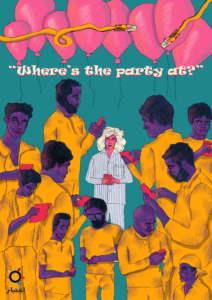
The focus of this research project is on identifying the change in the political participation of women after January 25, 2011 revolution analyzing the voting patterns of women as well as the obstacles to women’s participation, and the reasons for their participation to vote or refrain. The research is conducted through field research in five governorates. The research tries to identify women preferences when voting: which candidates or parties.
Over the period of the research (March 2014- February2015) the project conducted three focus groups discussions in five governorates (Cairo, Giza, Minya, Mansoura and Alexandria) and 20 key informants’ interviews with political prities’ leaders and members of parliament of 2012. The results were compiled and analyzed in a final report that will be available in March 2015 online in both English and Arabic accompanied by visual presentation and data graphics.
II. Bodily Integrity in the Family System in Egypt
Effect of Religious Fundamentalism on Bodily integrity of women in Egypt (A joint project with the Asian Pacific Resource and Research Center for Women- ARROW)
This is a three years project (2014-2016). The aim of this research is to develop an evidence base research that explore the different influences of the family system in Egypt on the bodily integrity young women, analyzing the different religious and cultural discourses used in the Egyptian context. Following the research phase (July 2014- February 2015) the results will be used to create and implement an advocacy agenda that will facilitate discussion between women’s rights and youth groups on issues around SRHR and create counter discourse conservatism and religious fundamentalism arguments.
III. The Villages’s Train Project “AL QATR”: Evaluation Rreport
This is an evaluation of the “Qatr Project”/Village’s Train (I will be calling it in both versions throughout this evaluation) that took place from January till December 2016 in different locations in the governorate of Minya in Upper Egypt. The villages were Barsha, Manhari, Abu Qurqas, Bayyadeya and Abou Ghreir as well as in the city of Minya and the town of Mallawi.
Our Training Activities:
a) Gender Studies Seminars
A series of 10-12 weekly seminars to explain and discuss certain subjects. The aim of this course is to offer a critical survey of contemporary gender studies in order to explore theoretical and practical challenges. It further examines the interface between gender theory and a variety of other theoretical perspectives applied to the study of the Middle East, including postcolonialism, poststructuralism. It also aims to introduce key analytic concepts and debates in the field of gender and development.
The participants are asked to write a final paper (2500 words at least) on an agreed subject with the school coordinator. The resource person in each session should have conducted work on issues related to Gender and/or Feminist Analysis.
These seminars are held bi-annually.
b) “We try” (February 2014- February 2015) supported by the Women Empowerment and Leadership Development for Democratization Project- www.weldd.org)
This one year initiative works to build the capacity of local young grassroots leaders (men and women) of understanding the context where they live and act; helping them to identify problems and conflicts in order to take collective actions with women in their villages. The final goal of the initiative is that women can realize that they can be agent of changes through working together on small projects. The three steps of the project are:
Conduct an assessment of the situations that create conflicts in villages through a rapid approach appraisal (social mapping).
Training community leaders on the peace building modules developed by the project
The leaders will work with the women in the village over 10 months through weekly meetings; these meetings will aim at helping women to identify wrong perceptions about gender roles, and the role of women in their communities.


Through this research, Ikhtyar takes a closer look at El Hafla (an Egyptian slang term stands for a trolling technique). The drive behind this research endeavor is to, understand when El Hafla as a technique is used to undermine feminist discourses online in Cairo.
This research initiative is non-comprehensive of the complexities of women’s realities. Yet, Ikhtyar marks with it the start of feminist organizing online, with a keen invitation for its community and interested Arabic-speaking feminist groups and collectives, to join. Ikhtyar revisits a brief history of blogging in Egypt, followed by a contrasting glimpse of what it means to be online today in Egypt.
V. Cairo 94

This research seeks to document the role of feminists in engaging with population policies enforced by states and international bodies, with a focus on feminists in the Global South—particularly Egyptian feminists—as well as feminists of color in the Global North. We explore how these feminists contributed to revealing the classist, patriarchal, and racist dimensions of population policies and programs. They used international arenas to negotiate for resources to be directed toward the sexual and reproductive health needs of the least privileged women. The ICPD Cairo conference is a historical starting point within this research, allowing us to draw a general picture of the local and international forces that determine the policies that impact our daily lives and establish limitations within which we can make choices and live our lives.


